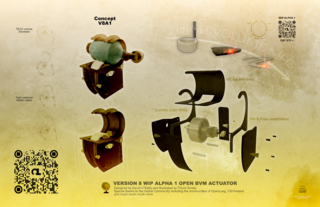
Computer-aided design (CAD) is the use of computers to aid in the creation, modification, analysis, or optimization of a design. This software is used to increase the productivity of the designer, improve the quality of design, improve communications through documentation, and to create a database for manufacturing. Designs made through CAD software help protect products and inventions when used in patent applications. CAD output is often in the form of electronic files for print, machining, or other manufacturing operations. The terms computer-aided drafting (CAD) and computer-aided design and drafting (CADD) are also used.

An original equipment manufacturer (OEM) is a company that produces parts and equipment that may be marketed by another company. However, the term is ambiguous, with several other common meanings: an OEM can be the maker of a system that includes other companies' subsystems, an end-product producer, an automotive part that is manufactured by the same company that produced the original part used in the automobile's assembly, or a value-added reseller.

An application-specific integrated circuit is an integrated circuit (IC) chip customized for a particular use, rather than intended for general-purpose use, such as a chip designed to run in a digital voice recorder or a high-efficiency video codec. Application-specific standard product chips are intermediate between ASICs and industry standard integrated circuits like the 7400 series or the 4000 series. ASIC chips are typically fabricated using metal–oxide–semiconductor (MOS) technology, as MOS integrated circuit chips.
Open architecture is a type of computer architecture or software architecture intended to make adding, upgrading, and swapping components with other computers easy. For example, the IBM PC, Amiga 2000 and Apple IIe have an open architecture supporting plug-in cards, whereas the Apple IIc computer has a closed architecture. Open architecture systems may use a standardized system bus such as S-100, PCI or ISA or they may incorporate a proprietary bus standard such as that used on the Apple II, with up to a dozen slots that allow multiple hardware manufacturers to produce add-ons, and for the user to freely install them. By contrast, closed architectures, if they are expandable at all, have one or two "expansion ports" using a proprietary connector design that may require a license fee from the manufacturer, or enhancements may only be installable by technicians with specialized tools or training.

A knock-down kit is a collection of parts required to assemble a product. The parts are typically manufactured in one country or region, and then exported to another country or region for final assembly. CBU, on the other hand, stands for "Completely Built Up" and signifies import of a finished product.

Open-source hardware consists of physical artifacts of technology designed and offered by the open-design movement. Both free and open-source software (FOSS) and open-source hardware are created by this open-source culture movement and apply a like concept to a variety of components. It is sometimes, thus, referred to as free and open-source hardware (FOSH), meaning that the design is easily available ("open") and that it can be used, modified and shared freely ("free"). The term usually means that information about the hardware is easily discerned so that others can make it – coupling it closely to the maker movement. Hardware design, in addition to the software that drives the hardware, are all released under free/libre terms. The original sharer gains feedback and potentially improvements on the design from the FOSH community. There is now significant evidence that such sharing can drive a high return on investment for the scientific community.

RepRap is a project to develop low-cost 3D printers that can print most of their own components. As open designs, all of the designs produced by the project are released under a free software license, the GNU General Public License.

A custom built or home-built computer is a computer assembled by its user and made of commercial off-the-shelf (COTS) components, rather than purchased as a complete and ready to use machine, also known as a "pre-built" or out-of-the-box system.

Modular design, or modularity in design, is a design principle that subdivides a system into smaller parts called modules, which can be independently created, modified, replaced, or exchanged with other modules or between different systems.

The OLPC XO is a low cost laptop computer intended to be distributed to children in developing countries around the world, to provide them with access to knowledge, and opportunities to "explore, experiment and express themselves". The XO was developed by Nicholas Negroponte, a co-founder of MIT's Media Lab, and designed by Yves Behar's Fuseproject company. The laptop is manufactured by Quanta Computer and developed by One Laptop per Child (OLPC), a non-profit 501(c)(3) organization.

The automotive industry in Canada consists primarily of assembly plants of foreign automakers, most with headquarters in the United States or Japan, along with hundreds of manufacturers of automotive parts and systems, a sector represented by the APMA.
This article provides an overview of the automotive industry in countries around the world.

The maker culture is a contemporary subculture representing a technology-based extension of DIY culture that intersects with hardware-oriented parts of hacker culture and revels in the creation of new devices as well as tinkering with existing ones. The maker culture in general supports open-source hardware. Typical interests enjoyed by the maker culture include engineering-oriented pursuits such as electronics, robotics, 3-D printing, and the use of computer numeric control tools, as well as more traditional activities such as metalworking, woodworking, and, mainly, its predecessor, traditional arts and crafts.
Serbia's automotive industry is one of the most important industrial sectors and makes about 15% of industrial output of the country and 18% of all exports.
N8VEM was a homebrew computing project. It featured a variety of free and open hardware and software. N8VEM builders made their own homebrew computer systems for themselves and shared their experiences with other homebrew computer hobbyists. N8VEM homebrew computer components are made in the style of vintage computers of the mid to late 1970s and early 1980s using a mix of classic and modern technologies. They are designed with ease of amateur assembly in mind.
Roughly 720,000 cars per year are being sold in Nigeria every year. Only c. 140.000 of them have been built domestically.

Open source is source code that is made freely available for possible modification and redistribution. Products include permission to use and view the source code, design documents, or content of the product. The open source model is a decentralized software development model that encourages open collaboration. A main principle of open source software development is peer production, with products such as source code, blueprints, and documentation freely available to the public. The open source movement in software began as a response to the limitations of proprietary code. The model is used for projects such as in open source appropriate technology, and open source drug discovery.

An open source ventilator is a disaster-situation ventilator made using a freely licensed (open-source) design, and ideally, freely available components and parts. Designs, components, and parts may be anywhere from completely reverse-engineered or completely new creations, components may be adaptations of various inexpensive existing products, and special hard-to-find and/or expensive parts may be 3D-printed instead of purchased. As of early 2020, the levels of documentation and testing of open source ventilators was well below scientific and medical-grade standards.

The ZX Spectrum Next is an 8-bit home computer, initially released in 2017, which is compatible with software and hardware for the 1982 ZX Spectrum. It also has enhanced capabilities. It is intended to appeal to retrocomputing enthusiasts and to "encourage a new generation of bedroom coders", according to project member Jim Bagley.















